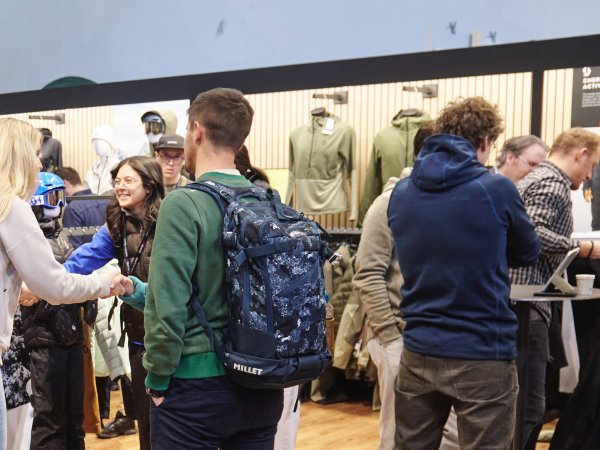- Cautious optimism for 2024
- Reluctance to consume capital-intensive goods
- Best practice: focus on niches and flexible purchasing
- Playing with the sports ecosystem
- Technologies: game changers for retail
- Out of the one-way street with omnichannel strategies
- Good customer service for a perfect shopping experience
- Loyalty programs boost sales
- Sustainability sells: Identifying greenwashing
- ISPO Munich 2024 Explorer Networks: Contacts are the key
According to the consulting firm, the sports industry generated global sales growth of six percent in 2023. Western Europe performed slightly better at eight percent - following a decline of three percent in the previous year. The industry is also recovering in the Asia-Pacific region with growth of eleven percent (minus four percent in 2022), as well as in the USA with growth of six percent (plus two percent in the previous year). Latin America recorded the highest growth at 22% (up 20% in the previous year). McKinsey cites "macroeconomic developments and negative consumer sentiment" as the biggest challenge. Nevertheless, the industry is robust, as the 85 companies surveyed by McKinsey and the World Federation of the Sporting Goods Industry (WFSGI) are cautiously optimistic for 2024. According to the report "Sporting Goods 2024 - Time to move", they are hoping for an improved market environment and new industry trends.
The current challenges for the industry are not only the high stock levels, which tie up a lot of capital, but also inflation, which continues to put the brakes on consumption. The Scandinavian retailer XXL Sport & Villmark has had "a quarter with weak sales", as Head of Communications Jan Christian Thommesen explains. He attributes this primarily to the low demand for capital-intensive goods. "However, we have a stronger and growing gross margin, which has improved our operating results. Our costs are increasingly under control and declining, and we are seeing a positive recovery in sales from March to June." According to Thommesen, the company is moving steadily in the right direction in the implementation of its "Reset & Rethink" strategy, with both the Must Win Battles and the restructuring going according to plan. "Our main focus is now on sales in order to get XXL back into shape by 2024/25." Christoph Krenn from Sport Krenn in Waging a. See has also noticed the reluctance to buy: "Customers are buying more, but cheaper items. I could clearly see that in August."
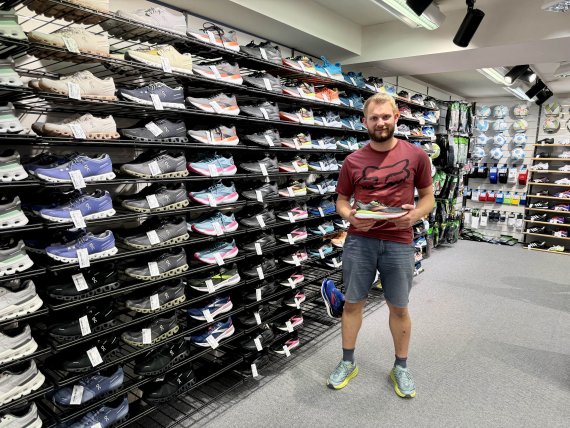
The Zukunftsinstitut predicts that the pressure to develop and implement sustainable business models is growing. In addition to the development of flexible structures within organizations, flexibility is also required when it comes to realizing customer wishes. Bergzeit CEO Martin Stolzenberger confirms this : "Day-to-day business in eCommerce and retail is often characterized by low margins. The pressure on the operating result is correspondingly high. There are no periods of relaxation throughout the year. Nevertheless - thanks to the consistent focus on our niche, good operations and our flexible purchasing - we were able to further expand our market and record double-digit growth (twelve percent compared to the previous year)."
Demand is increasingly shifting away from individual products towards comprehensive health and activity-oriented solutions, according to McKinsey and others. The Zukunftsinstitut also states that experiences are becoming increasingly important, with the product itself taking a back seat when making a purchase. In addition, consumers will have less purchasing power in the future, they will be more tech-savvy and look for stability, orientation and security. According to the Zukunftsinstitut, they will shift their disposable income from products to experiences. So if you want to survive as a retailer and position yourself for the future, you have to rethink.
Globetrotter, for example, regularly organizes hiking days in various regions of Germany and Sport-Scheck has organized Germany's largest and most traditional city running series to date (including in Hamburg, Munich and Leipzig). JD Sports appeals to its target group with urban and street events - the British retailer was even the main sponsor of the established splash! festival in Germany in 2024.
But it also works on a smaller scale: sports stores near the mountains like to use ski test days to offer their customers the opportunity to try out the latest alpine or touring skis.
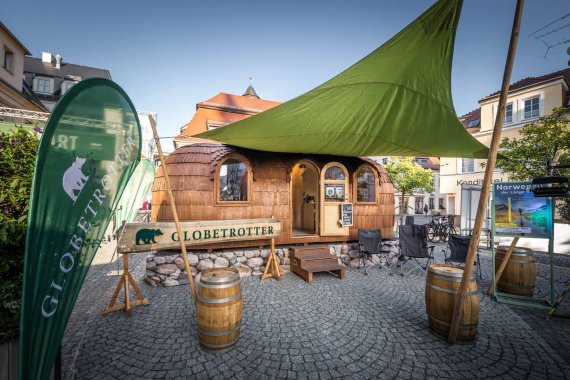
In-store technologies enhance the customer experience on site. At Bergzeit, a sole fitting is added to the running type analysis and then, at the latest, the employees know which shoe fits the customer's foot perfectly. Decathlon, for example, goes one step further: an RFID robot helps with stocktaking. It automatically travels through the aisles of the store outside of opening hours and scans the RFID labels on the products. In Ludwigshafen, it takes around 3.5 hours to cover an area of 4,300 square meters and 93,000 products - a sporting achievement! According to press spokeswoman Nora Lühne, Decathlon already has 64 automated employees working at the beginning of 2024. Other forward-looking technologies such as smart mirrors, which recommend suitable items to customers in the changing room, are waiting to be implemented. Experts agree that the use of artificial intelligence can increase a retailer's appeal and boost sales. Although sports retailer Krenn cannot imagine a robot welcoming his customers at some point, he does see huge benefits in the digitalization of his store: "Electronic delivery bills, invoice control with AI and new merchandise systems save me time, which I then have for my customers and their advice."
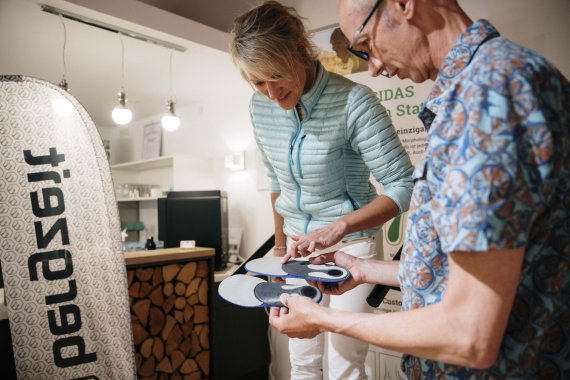
Omnichannel approaches offer numerous advantages for retailers - whether online or brick-and-mortar. These include a seamless customer experience across different channels. This increases customer satisfaction and loyalty, optimizes sales processes and improves the chance of increasing sales. "We firmly believe in omnichannel and strong interaction between store and online. That's why we also opened new stores in 2023 (Lillehammer, Skellefteå). We will always strive to optimize existing stores, build new ones and also strengthen our online presence," says Norwegian Thommesen. According to him, the XXL stores are "the platform for our omnichannel approach, with click & collect, ship-from-store and order-from-stock being the core functions that offer our customers a leading customer journey". With this strategy, XXL is the largest online sports and outdoor retailer in the Nordics, "a strong position that we want to further expand in 2024 and 2025 and beyond".
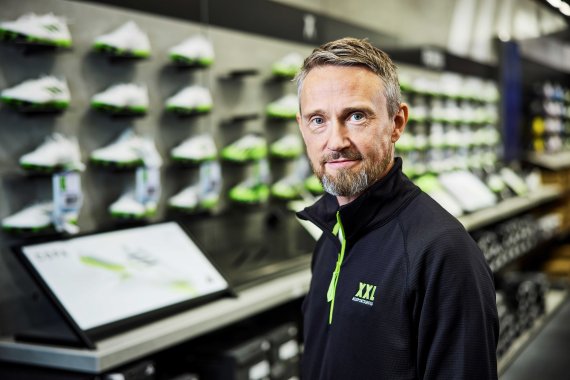
The importance of good customer service is repeatedly criminally underestimated, especially in eCommerce, say the experts from creativestyle in their "E-Commerce Experience Report" from 2023. In brick-and-mortar retail, employees are approachable in the store and can respond quickly and directly. This doesn't work so easily online. Nevertheless, every provider in the sports and outdoor market must be aware of how important a perfect shopping experience is. The more communication channels there are to choose from, the better, because a variety of channels can score points with customers. Nevertheless, according to creativestyle with an average of just two touchpoints per store, the sports and outdoor sector is still below average.
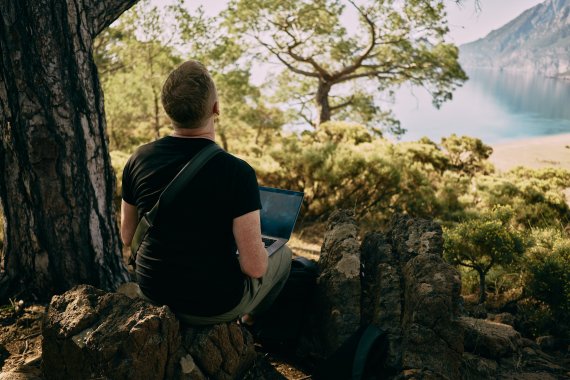
Another plus point for online sellers: customer loyalty measures such as the Bergzeit Club. The loyalty program was launched in November 2020. By registering, members collect summit points through their purchases, a product review or by tracking their sporting achievements via the apps of cooperation partners Strava and Vertical Life. In addition to discounts or vouchers, members receive early access to sales promotions, an invitation to regular customer days and the opportunity to win guided courses and tours. "Club members are very loyal customers, their order frequency is 15 to 20 percent higher than that of non-members," reveals Bergzeit CEO Martin Stolzenberger.
According to the Zukunftsinstitut, the pressure to develop and implement sustainable business models is growing rapidly. Hyper-informed consumers increasingly expect transparency and ethical behavior from the companies they buy from. This requires sustainable practices along the entire supply chain. Retail companies need to come up with innovative solutions in order to assume both ecological and social responsibility. Bergzeit, for example, introduced the MUT filter (MUT stands for Mensch, Umwelt, Tier) in 2020. "We have noticed that sustainability has become a boom and that everyone wants to get involved on the manufacturer and retailer side. At the same time, it is difficult to even identify sustainable products and recognize possible greenwashing," emphasizes Jule Schneider, People & Sustainability/CSR Manager. The MUT filter makes the ecological, social or animal welfare-related added value transparent. It is based on official seals selected and verified by Bergzeit (e.g. Grüner Knopf, Fairwear Foundation, RWS Down Standard). It also includes information that recycled materials are used or that the product is PFC-free. Schneider: "We use independent seals and comprehensible criteria to cover the most important categories - these mostly relate to the material, but also to the production facilities and the social treatment of employees. In this way, we create confidential facts and make them as clear as possible for the end consumer."
In its white paper "The Future of Retail", the Zukunftsinstitut recommends that every retailer "learn from and network with others - keyword Explorer Networks". These networks would offer countless opportunities to tackle the multitude of challenges. Where better to do this than at ISPO Munich 2024? Contacts and conversations often arise spontaneously as you walk through the various areas - hence the slogan "Love Every Contact". Because: Every contact pushes you forward! Contacts are the key to success - in sport and in business. Contacts enable experiences, reveal solutions, offer insights and provide orientation.
Feel, touch, experience: ISPO Munich will once again be a rendezvous for the industry in 2024 - nowhere else is there the opportunity to meet retailers so quickly, so easily and so intensively, as well as to see new and well-known brands and their new developments. Chantal Caron, A&P Manager Globetrotter, for example, said during one of her ISPO Munich visits: "We are looking forward to the personal exchange with our partners and the opportunity to look at brands and collections at the trade show that we don't currently carry in our range." This year's exhibitors include the brands Bergans of Norway, Blackroll, Oakley, Fjällräven, Icebug, Polartec and many more - see here: Sneak Peek Exhibitor Brands 2024. And another insider tip: the Pickleball & Padel Village is the ideal meeting place to test the latest equipment from leading brands and see top players in action.
Must-visit at ISPO Munich 2024: Whether retailer or entrepreneur, the Digitize & Retail Hub in the Future Lab is the place-to-be that provides a profound insight into the world of digitalization. Solution providers, services, consulting and technology companies from the retail, transformation and digitalization sectors offer their latest ideas and solutions at the curated marketplaces on the topics of transformation and digitalization. Industry pioneersprovide exciting insights into the digital landscape in the interactive exhibition spaces. Companies from the retail, technology and digitalization sectors will showcase the latest trends in retail technology.
One of the biggest challenges facing the sports industry is to find solutions that regenerate both people and the planet. So the question is, how can sports retail respond effectively and sustainably to changes such as Covid, wars and global crises, how can a changed mindset have a positive impact on society and the environment and how can we reduce our own risk at the same time? From high-tech materials and intelligent wearables to digital innovations: In the extensive supporting program of ISPO Munich 2024, leading speakers, companies, start-ups and experts will present visionary solutions to ensure the future viability of the sports industry and change the sports sector. This will be complemented by Sports Tech Nation, the most important summit of the sports technology industry. Completing the expanded conference program at ISPO Munich 2024, Sports Tech Nation provides a platform for influential leaders in sports and technology to come together, discuss new trends and learn about the industry's most groundbreaking technologies.
For retailers looking for the best products and innovations, the renowned awards - ISPO Award, ISPO Brandnew and ISPO Textrends - offer an indispensable guide. Every year, experts from the sports and outdoor industry select the most outstanding products that are characterized by innovation, functionality and sustainability. These awards serve as a reliable compass for identifying the best and most sustainable products for the product range. By aligning themselves with the award-winning products, retailers ensure that they only offer the highest quality and most innovative solutions that meet current market requirements. Former ISPO Brandnew award winners such as GoPro, Naish Kites, Maloja, Nixon and On, for example, are shaping the market today.
- Awards
- Mountain sports
- Bike
- Fitness
- Health
- ISPO Munich
- Running
- Brands
- Sustainability
- Olympia
- OutDoor
- Promotion
- Sports Business
- Textrends
- Triathlon
- Water sports
- Winter sports
- eSports
- SportsTech
- OutDoor by ISPO
- Heroes
- Transformation
- Sport Fashion
- Urban Culture
- Challenges of a CEO
- Trade fairs
- Sports
- Find the Balance
- Product reviews
- Newsletter Exclusive Area
- Magazine
